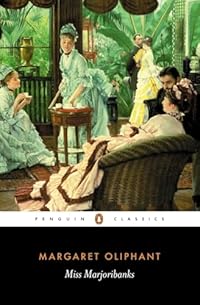Miss Marjoribanks by Margaret Oliphant
Posted in Scottish Literature, Scottish Fiction, Reading Reviewed at 21:00 on 2 June 2018
Penguin Classics, 1998, 499 p, plus 21p Notes, 28 p Appendices, i p Contents, iv p Chronology of the author’s life, xxii p Introduction, iii p Notes on the Introduction, ii p Further Reading, ii p A Note on the Text. First published, serially, in Blackwood’s Edinburgh Magazine 1865-6 and in three volume book form, 1866. One of the 100 best Scottish Books.

Four years after her mother’s death, Miss Marjoribanks (that designation is used much more frequently than the character’s given name, Lucilla) returns to Carlingford from her education (plus a year’s finishing in Switzerland and Italy) and sets out to redesign not only her father’s domestic arrangements but also the polite society of the town. Constantly declaiming it is her sole purpose to be “a comfort to Papa” she feels duty bound not to marry for at least ten years and none of the eligible bachelors who enter her orbit manages to “engage her affections”. Not Mr Cavendish whose sister is the town mimic, forever taking people off, and whose origins are somewhat obscure but is said to be “one of the Cavendishes”; not the Archdeacon, Mr Beverley, who is favourite to become bishop should Carlingford ascend to the status of a see; not even Mr Ashburton, despite Miss Marjoribanks immediately divining that he is the man for Carlingford when the old MP dies and nudging him onto the path to candidacy.
The first two volumes are given over to the workings out of the relationships between Lucilla and the former two men and the interest shown – especially by the ladies – in any possible match. The third is set after those ten years have elapsed. Much of the intrigue is centred round Lucilla’s institution of “evenings” every Thursday. The narrative is not quite so wordy as a Walter Scott novel but is still fairly prolix, possibly due to its initial serialisation in Blackwood’s Magazine.
Prominent are Oliphant’s thoughts on men as mediated through Miss Marjoribanks’s views and comments. In this discourse pronouns for men as a group are frequently capitalised and italicised as They, Their and Them. One of Lucilla’s observations leaves no doubt as to which she thinks is the more capable sex. “‘I am so sorry I don’t understand about politics. If we” [women] “were going in for that sort of thing, I don’t know what there would be left for gentlemen to do.’” Lucilla’s condescension to the lower orders (such as Barbara Lake and her sister Rose, the latter of whom considers herself eminently respectable, but who are the daughters of the town’s drawing master and so forever below the salt) strikes the modern reader forcibly and seems to reflect Oliphant’s own opinions. However, very little of Oliphant’s Scottish background is evident, really only this, “Dr Marjoribanks was Scotch, and had a respect for ‘talent’ in every development, as is natural to his nation,” but a certain English attitude permeates the sentence, “she had been brought up in the old-fashioned orthodox way of having respect for religion, and as little to do with it as possible.”
It struck me on reading this that Oliphant’s Carlingford novels might make a suitable project for adaptation for TV instead of the usual suspects which are trotted out on a regular basis.
PS: Those of a sensitive nature might note that the text also contains a word which might offend the modern sensibility but which was used thoughtlessly in Victorian times in the line, “the committee, which ordered him about like a nigger.”
Pedant’s corner:- “‘Oh, nonsense, Lucilla.’” (Though she was present, the previous speaker had not been Lucilla,) “‘and me who have such a respect for religion’” (me who has,) “the Miss Browns” (the Misses Brown,) “a succession of dreadful thumps were heard” (a succession was heard,) “the Miss Blounts” (the Misses Blount,) “A series of the most enthusiastic compliments were paid” (strictly, a series was,) “neither of the two were very poetical” (neither of the two was…,) Westeria (wisteria,) goloshes (galoshes,) canvass (canvas, it was for a painting.) “Lucilla caught , as it were, and met, and forced to face her, her informant’s … look” (looks to have a “her” too many and also seems syntactically out of sorts,) two Miss Ravenswoods (Misses Ravenswood,) the Miss Penrhyns (the Misses Penrhyn,) Affghanistan blanket (nowadays Afghanistan.)
In the Notes: “the, shorter, Nicene creed” (the shorter, Nicene, creed,) “the pro-Dissenting wing … were campaigning” (the pro-Dissenting wing was campaigning.)
